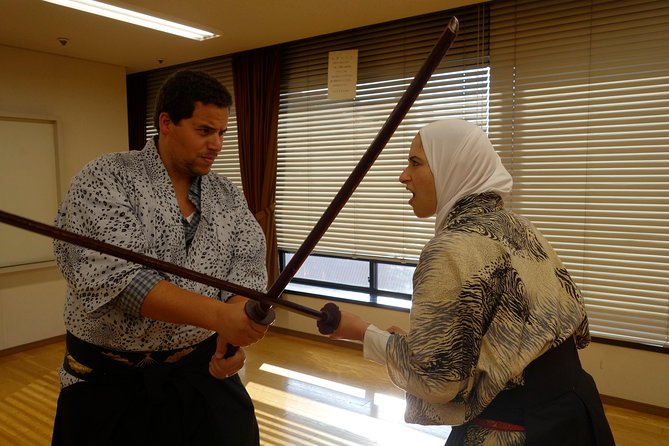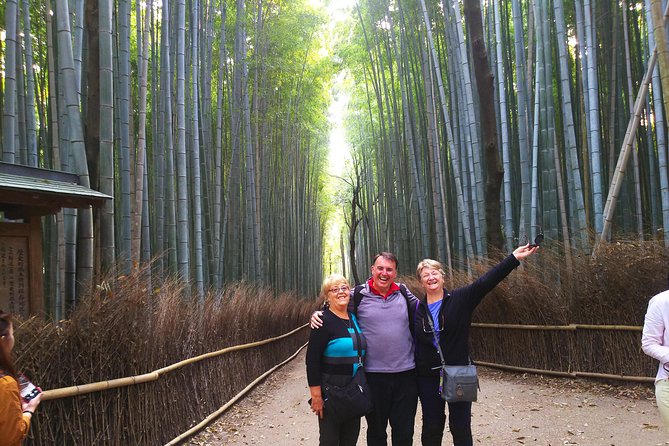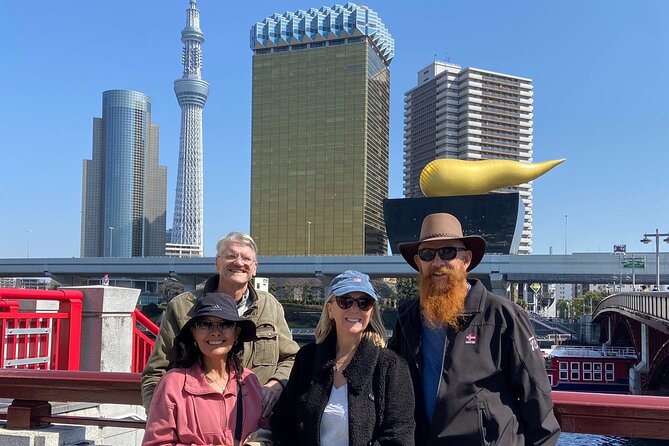Tokyo: Practicing Zen With a Japanese Tea Ceremony
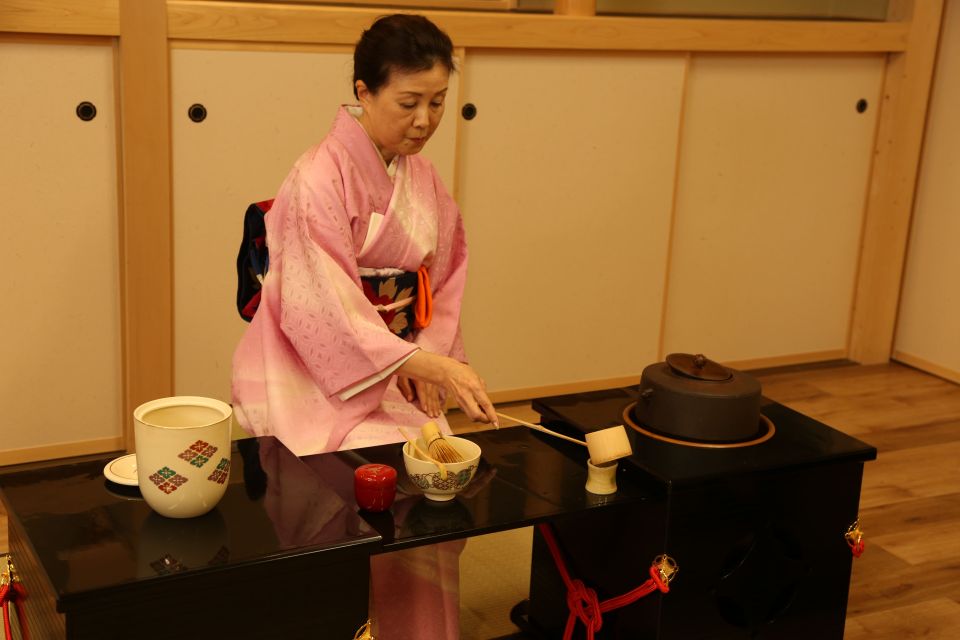
Like a gentle breeze carrying the fragrance of cherry blossoms, practicing Zen through a Japanese tea ceremony in Tokyo can transport one to a realm of tranquility and mindfulness.
The art of preparing matcha green tea is not just a ritual but a profound experience that intertwines tradition with spiritual reflection.
As participants enjoy the elegant choreography of this centuries-old practice, they begin to unravel the layers of meaning hidden within each gesture and sip.
Curious to uncover the secrets of this ancient art?
More nearby cooking classses we've reviewed
Key Points
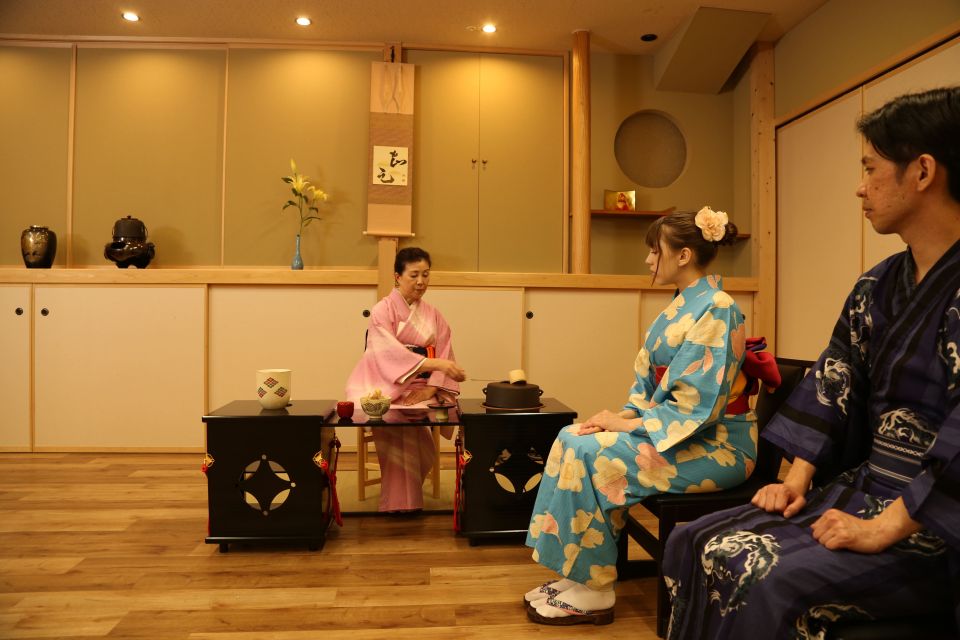
- Experience the art of the Japanese tea ceremony and Zen Buddhism firsthand.
- Learn about the traditional practices and utensils involved in the ceremony.
- Participate in recreating the tea ceremony with expert guidance.
- Enjoy the tranquility and cultural significance of this traditional Japanese experience.
It's also worth checking out some other tours and experiences nearby.
Experience the Art of Tea Ceremony

Discover the serene art of the Japanese tea ceremony and explore the essence of Zen Buddhism through a hands-on experience. Participants will engage in Zen meditation while seeing the rich tapestry of Japanese culture.
During the session, they’ll witness the instructor skillfully prepare matcha green tea, gaining insight into the utensils and rituals involved. With expert guidance, attendees will have the opportunity to recreate the ceremony themselves, experiencing firsthand the tranquility and cultural significance it embodies.
This interactive encounter offers a unique way to connect with both the art of the tea ceremony and the spiritual practice of Zen meditation, providing a profound glimpse into the intertwined worlds of Japanese tradition and mindfulness.
Discover Zen Buddhism Connection
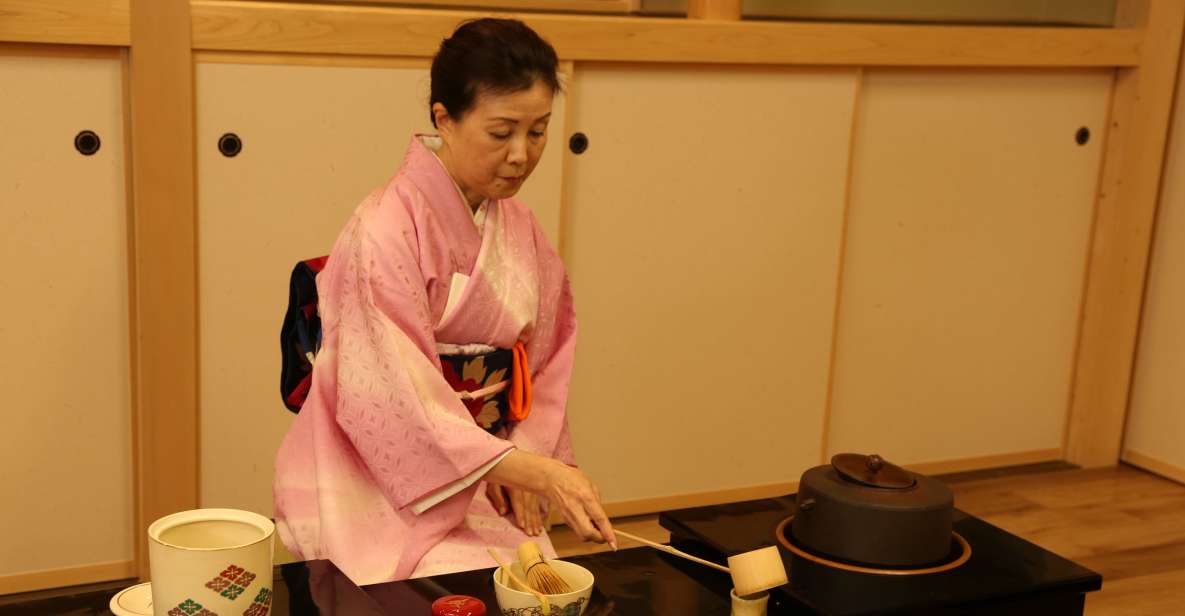
Participants in the Japanese tea ceremony not only witness the intricate preparation of matcha green tea but also experience a profound connection to Zen Buddhism through the mindfulness and cultural significance embedded in each ritualistic gesture. The ceremony serves as a gateway to the Zen philosophy, emphasizing simplicity, presence, and inner peace.
Here are five ways participants can deepen their understanding of Zen Buddhism through the tea ceremony:
- Engage in Zen meditation while sipping matcha
- Practice mindfulness by focusing on each ceremonial movement
- Reflect on the impermanence of life and the beauty in simplicity
- Embrace the concept of wabi-sabi, finding beauty in imperfection
- Connect with the present moment through the sensory experience of tea preparation
Watch Matcha Preparation
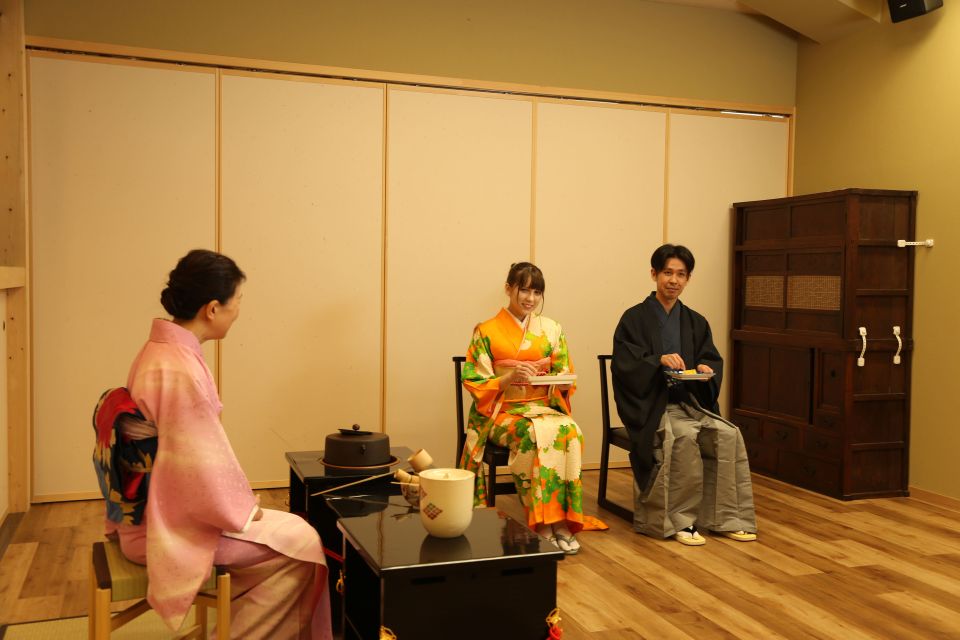
During the tea ceremony, observing the instructor prepare matcha green tea is a captivating experience that offers insight into the meticulous artistry of the process. The careful steps involved in creating a perfect bowl of matcha are a true reflection of Japanese traditions and tea culture. From measuring the matcha powder to whisking it into a frothy consistency, every movement is deliberate and meaningful. The ceremony showcases the deep-rooted connection between tea preparation and Japanese traditions, emphasizing the importance of mindfulness and precision in every action.
| Step | Description |
|---|---|
| Measure Matcha | Precisely measure matcha powder. |
| Whisk Matcha | Vigorously whisk matcha and water. |
Learn Utensils and Practices
In the upcoming section, explore the various utensils and practices essential to the Japanese tea ceremony.
- Chasen (tea whisk): Used to froth the matcha tea.
- Chawan (tea bowl): Where the matcha is prepared and served.
- Chashaku (tea scoop): Measuring and scooping the matcha powder.
- Fukusa (silk cloth): Used for purifying the tea utensils.
Practice mindfulness: Focus on the present moment and the ceremonial actions.
Tea etiquette: Follow the traditional manners and behaviors during the ceremony, showing respect for the tea, the utensils, and your.
Recreate Ceremony With Expert Guidance
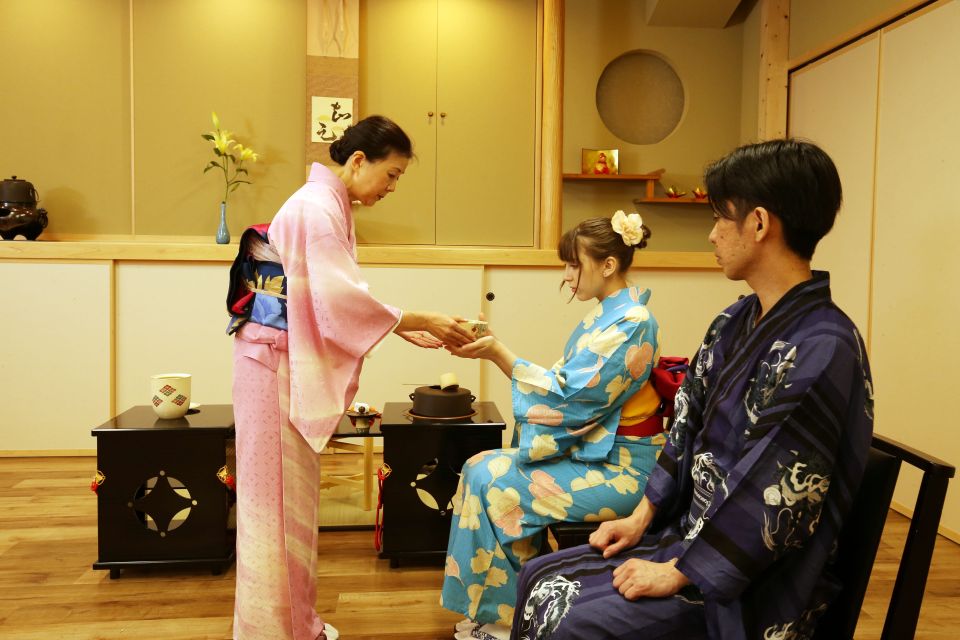
With expert guidance, you will be able to recreate the Japanese tea ceremony, seeing the traditional practices and rituals.
During this experience, individuals will have the opportunity to practice mindfulness as they learn to prepare and serve matcha green tea following the precise steps of the ceremony.
The expert instructor will provide detailed explanations on the cultural significance of each ritual, allowing for a deeper culture.
Participants will engage in the art of the tea ceremony, gaining a better understanding of its connection to Zen Buddhism.
Explore Tranquility and Cultural Significance
Participants can deeply appreciate the tranquility and profound cultural significance embedded in the Japanese tea ceremony as they engage in the art of preparing and serving matcha green tea under expert guidance.
-
Discover mindfulness: Engage in the present moment and find inner peace through the meticulous steps of the tea ceremony.
-
Cultural immersion: Enjoy Japanese traditions and customs, gaining a deeper understanding of the cultural roots of the tea ceremony.
-
Connection to nature: Experience harmony with nature as you savor the earthy flavors of matcha and appreciate the simplicity of the ceremony.
-
Historical significance: Learn about the historical importance of the tea ceremony and its evolution over time.
-
Personal reflection: Take a moment for self-reflection and introspection as you partake in this ancient ritual.
Frequently Asked Questions
Are There Any Specific Dress Code Requirements for Participating in the Japanese Tea Ceremony?
For the Japanese tea ceremony, participants are encouraged to wear traditional attire to respect cultural customs. This enhances the experience and shows appreciation for the ceremony’s traditions. Comfortable clothing that allows ease of movement is recommended.
Can Participants Take Photographs or Videos During the Tea Ceremony?
Participants should refrain from taking photographs or videos during the Japanese tea ceremony to maintain cultural sensitivity and respect. It is customary to focus on the ceremony itself and immerse in the experience without distractions.
Is There a Specific Etiquette or Behavior That Participants Should Follow During the Ceremony?
During the tea ceremony, participants should adhere to specific etiquette guidelines and cultural customs. This includes maintaining a respectful demeanor, following the lead of the instructor, and refraining from making noise. Observing these practices enhances the experience for all.
Are There Any Restrictions on Food or Beverages That Participants Can Bring to the Tea Ceremony?
Participants should adhere to food and beverage restrictions during the tea ceremony. Bringing outside food or drinks is not allowed. Respect for the traditional setting and focus on the tea experience are key elements of this cultural practice.
Can Participants Purchase Any Tea Ceremony-Related Items or Souvenirs at the Venue?
Participants can purchase tea ceremony-related items and souvenirs at the venue. These items can include traditional tea sets, matcha powder, tea bowls, and other accessories. It’s a great way to take a piece of the tea ceremony experience home.
Recap
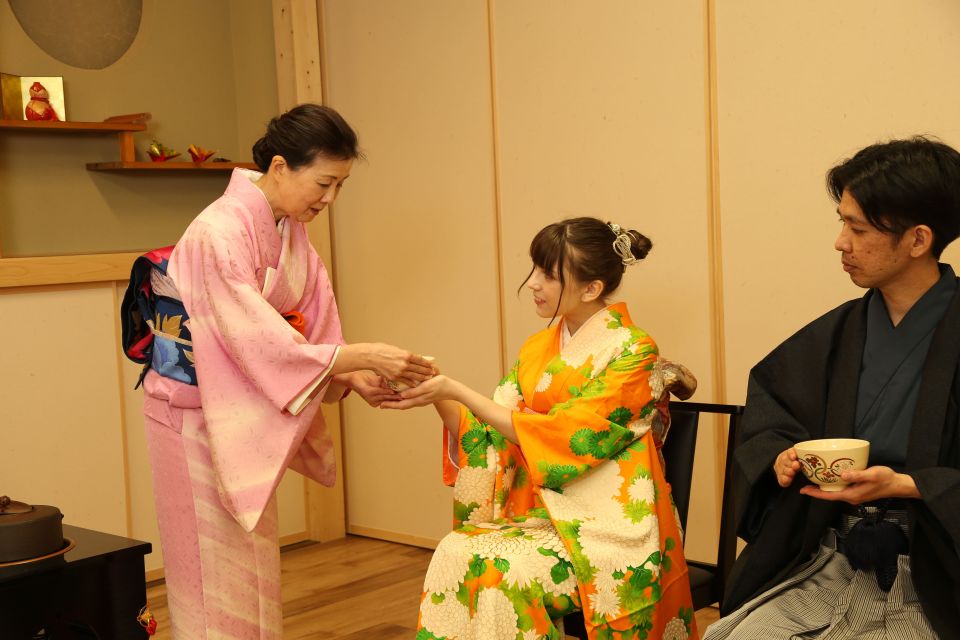
Enjoy the serenity of a traditional Japanese tea ceremony in Tokyo to experience the art of mindfulness and tranquility.
Discover the deep connection between Zen Buddhism and the ritual of preparing matcha green tea, guided by expert instructors.
Explore the cultural significance of this ancient practice and savor the harmonious blend of spirituality and tradition.
Embrace the opportunity to recreate this enlightening ceremony and gain a deeper understanding of Japanese culture in the heart of Tokyo.


